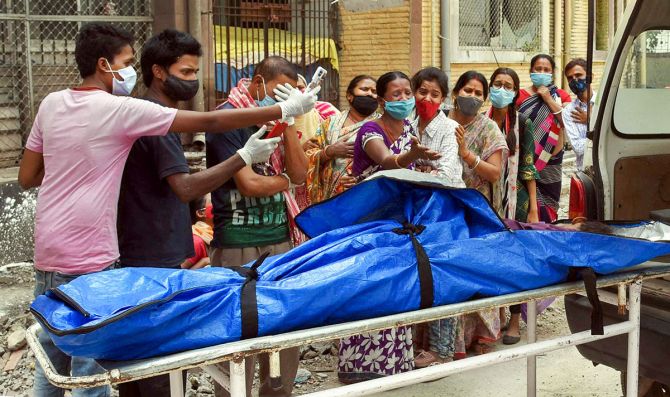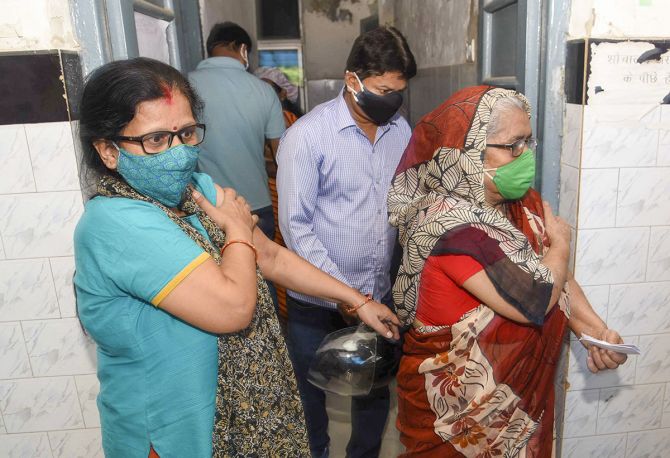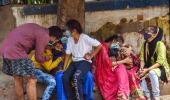'It is a terrible time, but yet there are enough examples of the goodness of people.'

"People are scared to help COVID-19 patients. It is a terrible time, but yet there are enough examples of the goodness of people. In the misery, there are people who continue to help. That is admirable," says Dr Kamlesh Tiwari, FRCP [Fellow of the Royal College of Physicians] and a physician for 47 years.
Dr Tiwari has been providing free teleconsultation to COVID-19 patients in Bihar and to callers from other states as well.
Presently based in Muzzaffarpur, he headed the department of medicine at the Patna and Darbhanga Medical Colleges and also worked for five years in the UK and Scotland.
The doctor was infected with the coronavirus in the first wave and has been spending most of the day answering calls from anxious COVID-19 patients.
As the case load reduced in Bihar for four consecutive days, he warns although cases are decreasing in towns, the state should be prepared for an increase in infections in the villages.
In a phone interview with Rediff.com's Archana Masih, Dr Tiwari says COVID-19 has struck India like a natural disaster and even developed countries would have found it difficult to face the ferocity of India's second COVID-19 wave.
Medical experts say that 85% COVID-19 patients recover in home isolation and only 15% need hospitalisation.
As a doctor providing teleconsultation to Covid patients when hospitals do not have enough beds and oxygen, what has been your observation when advising such patients?
This observation that only 15% patients need hospitalisation is easier said in theory than practice.
When people test positive for COVID-19, the first thing the feel is fear. They are scared.
They want a doctor to see them and that's why they are anxious to get to a hospital.
Those who require hospitalisation are unable to get beds or are getting admission with great difficulty.
Many patients would rather stay at home because they fear they will not return alive from a hospital because they know the situation in hospitals is very bad.
Why has the health infrastructure collapsed so badly?
It was bound to collapse. Hospitals and oxygen plants can't be built in a day.
When you can't provide oxygen to patients who need it, it is not a failure, it is a disaster.
The crisis is so severe that even though the government is trying its best it is not able to control it. Even developed countries like the USA, UK and Italy saw a collapse of their health infrastructure in the COVID-19 surge. Compared to those countries, India has a vast population and poor health infrastructure.
COVID-19 has hit us is like a natural disaster and we don't have the required infrastructure to face it.

As people gasp for breath, oxygen has been transported from abroad and from different places in India, why did the government not prepare for this beforehand?
The government is trying its best to provide oxygen to meet the demands of hospitals. Doctors, nurses, frontline workers, Good Samaritans -- everyone is trying their best, yet there are some bad people among us who are making profits from people's misery.
They are hoarding oxygen, ambulances are charging exorbitant costs and drugs are being sold at unimaginable amounts.
People are scared to help COVID-19 patients. This virus is separating father from son and mother from daughter.
It is a terrible time, but yet there are enough examples of the goodness of people.
In the misery, there are people who continue to help each other. That is admirable.
The COVID-19 surge started last March, why did India not prepare for a second wave when it had a year to do so?
We were not prepared for such a disaster. No one thought that a second wave would hit with such ferocity. Everybody thought things will improve.
It is easy to say that we were not prepared. It is human nature that we tend to relax when things improve.
Feature Presentation: Aslam Hunani/Rediff.com










